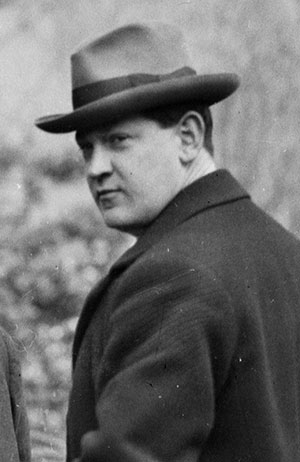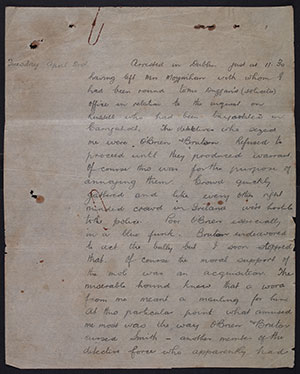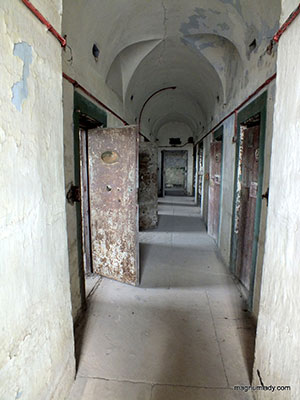Michael Collins’s jail journal, 2–21 April 1918
Published in Features, Issue 2 (March/April 2018), Revolutionary Period 1912-23, Volume 26‘The head of a landlord in one hand and the tail of a cow in the other—these are the arguments to use when you argue with an Englishman.’
By Phelim Brady

Above: Michael Collins, the ‘Irish Pimpernel’—once arrested in broad daylight in the centre of Dublin.
Importance overlooked
In typical fashion, Collins kept a journal while in jail in which he recorded his experiences and thoughts in meticulous detail. The importance of this journal has been overlooked and misunderstood. It has been described as the optimistic work of a ‘young man of energy’ that does not contain information ‘either new or startling’ (Íosold Ó Deirg, Studia Hibernica). On the contrary, in the journal we see for the first time what is to come—hidden, to be sure, by humour. Collins is unguarded and playful but optimistic for the coming fight, and deadly serious. This is the voice of the laughing boy as well as that of the ‘big fellow’.
After his arrest, Collins was handed over to detectives Smyth and Wharton. In 1919 Smyth was the first G-man targeted by the newly formed ‘squad’, and the business was particularly bloody owing to the small calibre of the bullets. Smyth died weeks later from his wounds. Wharton attended his colleague’s funeral but was later himself gunned down; he survived but left the service. Most detectives, jailers and court officials were not as assertive as Smyth and Wharton. They were, by and large, Irish Catholics and so were uneasy in their dealings with the likes of Collins, who was both their social superior and no mere common criminal. This anxiety was not reduced following the death of Thomas Ashe by force-feeding.
Condescension
Collins exploited these weaknesses and in his journal we see how he uses condescension, mind games and intimidation to get his way:
‘Be disdainful with members of the force and then patronize them, in this way you’ll command respect from them and your wants will, generally speaking, have attention.
I told a DMP man that if that Sergeant continued his rudeness I’d see that we wouldn’t catch the early train at B’stone [Broadstone].
Refuse[d] to take cigarettes unless I got the box myself to keep while on exercise. Eventually I prevail.’
At the courthouse in Longford Collins saw the RIC district inspector stationed in Granard, and noted that he ‘shifted his eyes in an uneasy manner under my gaze—no character in the man. Every inch a coward.’ He wonders whether he was involved in the arrest of ‘poor Tomas Aghas’ and resolves ‘to hold converse with him some day on the matter’. Collins noted and gave thanks for the kindness shown by ‘two extremely young boys’ who recognised him as he waited in handcuffs for the train and ran to fetch him a newspaper. He contrasts their courage with the craven behaviour of two fellow passengers, both Sinn Féiners, who ‘had not the stamina to speak to me’.
Collins complained again and again about his mattress in Sligo jail: ‘Spent a hopelessly sleepless night. Don’t know why as I was tired enough going to bed. Mattress an awful thing. Reminded me of a sack half filled with sods of turf.’ Despite a change of mattress he continued to complain about sleepless nights. But on 11 April all this gloom lifted as he announced: ‘Miss Helen Kiernan of Granard was to visit me today’. As well as talk of campaigning in Longford, he says that ‘all the people in Granard have always been very nice and kind to me’. He ‘succeeded in prevailing on Miss Kiernan to remain over in Sligo tonight and come to see me again in the morning’. After Kiernan leaves his cell his spirits lift:
‘This is a most glorious April evening. Birds singing and chirping. Beautiful sunshine. Even in a cell 12 by 7 a man can feel nature reclothing herself. In very truth an evening for the open road. By standing on my table I can see Knocknarigh in the distance … It is at present bathed in the light of the sinking sun and the cairn over the resting place of Maebh the warrior is scarcely discernible.’
This moment of joy was followed by ‘appalling loneliness with the blackest despair in my heart’.
Germany and the war

Above: ‘Tuesday April 2nd Arrested in Dublin just at 11.30 having left Mrs Moynihan with whom I had been round to Mr Duggan’s (solicitor) office in relation to the inquest on Russell who had been bayoneted in Carrigaholt. The detectives who seized me were O’Brian & Bruton …’ (NLI)
Collins quotes newspaper rumours of large numbers of German ‘super-submarines’ preparing for a dash to the Channel. ‘This is obviously a move to cut off the retirement by sea of the extreme left [of the] British Army in case of the Germans driving in a wedge from Armentieres to the sea. If successful in this move the Germans will have those considerable British Forces much as Washington had those of Lord Cornwallis at Yorktown.’ Elsewhere he laments: ‘What a pity that two such nations as France and Germany should be bleeding each other for the sake of England’.
In April 1918, while Collins was still imprisoned, Lloyd George introduced a bill to bring conscription to Ireland. Collins believed that this move would harden nationalist opinion in Ireland and be the end of the Irish Parliamentary Party. If they could not resist conscription, there could be no justification for them attending Westminster. But what most alarmed Collins was de Valera and Griffith’s response to an invitation from the lord mayor of Dublin to join with other parties in a conference to resist the bill. Sinn Féin was the only anti-war party in Ireland, he argued, and ‘it is therefore the only Party capable of speaking for the Irish Nation. And instead of holding a conference with [the Irish Parliamentary Party] … our party should arraign these traitors.’ Collins went on to draw a distinction between the political and military wings of the independence movement. ‘I hope that any rate the Executive of the IV [Irish Volunteers] shall have no part in such a conference and shall give no one attending it authority to speak on behalf of the IV.’ De Valera and Griffith, he feared, had ‘fallen into Sherlock’s [the lord mayor of Dublin] trap’.
‘Shoot but don’t argue’
Collins quoted, with ironic approval, The Spectator’s advice to the government—‘shoot but don’t argue’—when introducing conscription. He commented that this should be used as a slogan for anti-conscription propaganda: ‘Conscription in Ireland—Shoot but DON’T Argue’. With unguarded bravado and playful hyperbole Collins rejected parliamentary politics, insisting that when engaging with the English you must appear with ‘the head of a landlord in one hand and the tail of a cow in the other’. Almost immediately, in a more considered tone, he predicted, or at least anticipated, the conflict to come within the independence movement. He praised Sir Edward Carson for his ‘clear thinking’ about the conscription crisis and for seeing the opportunities in it for Ulster while nationalist leaders were being duped.
Towards the end of his confinement his frustration boiled over: ‘But Oh! Lord I do wish I was out’. He complains that his colleagues in Dublin are tardy in effecting his release:

Above: Inside Sligo jail today, where Collins was remanded in April 1918. (Magnum Lady)
As preparations were being made for his release, he reflected again upon the kindness shown to him and his own thoughtlessness before imprisonment.
‘Mrs Hanley was to visit me again today. She has been most awfully kind and thoughtful. Really it’s hard not to feel embarrassed when I think of all the trouble and inconvenience I am putting people to. Especially as when at large myself I am the most thoughtless person in every way in the world. There is indeed plenty of cause for my being ashamed.’
Many of his comrades would later attest that he never forgot this lesson, or them, when they were locked up.
This prison journal is an important primary source but its dissemination had been hampered by Collins’s secretary, Sinéad Mason, who kept it hidden for years (admirable behaviour in a loyal personal assistant but not much help to historians!). It now resides in the National Library of Ireland, where it is in the process of being digitised and will shortly be available to the public on the NLI website.
Phelim Brady is a retired sociology lecturer.
FURTHER READING
National Library of Ireland, Sinéad Ní Dheirg papers, MS 49,667.
Í. Ó Deirg, ‘“Oh! Lord the unrest of soul”: the jail journal of Michael Collins’, Studia Hibernica (1994), 7–34.
M. Ryan, Michael Collins and the women in his life (Cork, 1996).
















